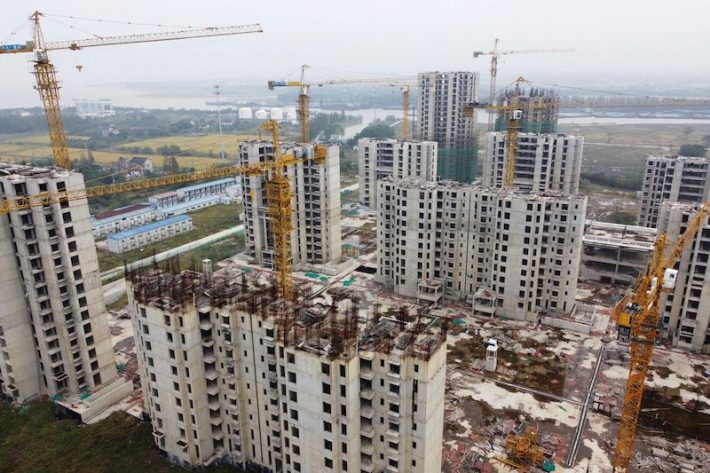China’s move to convert some of the country’s massive number of unsold homes into affordable housing is unlikely to help debt-laden developers due to the programme’s limited size and potentially low prices, analysts say.
Part of the reason for that is the extraordinary total of unsold and incomplete homes, which is said to exceed 50 million apartments on the mainland.
As part of a support package for the crisis-hit property sector, Beijing announced a 300 billion yuan ($41 billion) lending facility last month, which could result in 500 billion worth of bank financing for local state-owned enterprises (SOEs) to purchase completed and unsold homes.
ALSO SEE: As EU Eyes Tariffs, European States Chase China EV Factories
Chinese banks are expected to extend cheaper loans to SOEs via the facility, backed by the central bank, to help them buy the homes from developers at “reasonable prices” to turn them into affordable housing.
Some private developers, however, see very few, if any, of their projects being selected as the lending facility is inadequate and the scheme is only expected to launch in bigger cities where affordable housing is available. Price offers from SOEs are also likely to be low, they say.
Cautious response
The cautious attitude of developers could be a challenge for Beijing, as waves of support measures over the past two years have failed to revive the sector, which at its peak accounted for a quarter of GDP and remains a major drag on the economy.
Xintangzhen, a town in Guangzhou, issued a notice on May 30, the first local government to do so after the support package, to purchase “suitable housing stock” for resettlement housing.
The local government would buy the homes at cost price, reported China Real Estate Business, a media outlet managed by the housing authority, citing the notice.
A project co-owned by state-owned Jinmao and major developer Vanke had applied, the news report added.
Some developers said buying at cost, which means a 20-30% discount to market price, was better than expected.
A senior executive at a private developer in default said his firm would be interested to apply if other cities make similar offers as Xintangzhen, but he expects offers to be low and insufficient to cover construction loans.
“If it’s not even enough to cover the development loan, how do we repay the loan? The lending bank would not agree either,” said a senior official at a Shanghai-based developer, who declined to be identified due to the sensitivity of the matter.
Analysts at Citi and Bank of America have, however, said discounts of 50% in prices are needed to ensure modest returns for the SOEs, as affordable homes typically sell at 10-50% discounts to private homes.
Even if developers are able to profit from selling completed apartments to the SOEs, local governments may require proceeds be used to finish existing projects rather than to repay debt.
“This will not help us as a listed company, or our offshore debt repayment,” an executive at another developer in credit default said.
Gavekal Dragonomics estimates that at average market prices, 500 billion yuan in purchases would pay for 12% of housing inventories, or 20% if bought at a discount.
S&P said that converting existing inventory into social housing would also increase transactions at the low-end and bring down overall prices.
China’s housing ministry, central bank, the top banking regulator and local housing authority in Guangzhou did not respond to requests for comment. Jinmao did not respond to a request for comment and Vanke declined to comment.
Many projects not completed
“Only a handful of distressed developers will benefit,” said S&P Global Ratings credit analyst Esther Liu. “(Completing construction) is the problem the distressed developers are facing. They don’t have a lot of completed inventory.”
While developers await clarity on SOE demand and price offers, some bankers say the affordable housing scheme could lead to a deterioration in asset quality as SOEs would struggle to generate sufficient profits to repay bank loans.
Banks can borrow from the 300 billion re-lending facility at 1.75% interest to finance 60% of loans they offer to SOEs.
In aggregate, analysts estimate, that SOEs would have to pay around 2.5% interest for these loans, similar to average rental yields in China.
“This is good for the property sector but bad for the SOEs and the banks, because essentially you’re shifting some risk to them,” said the first executive, who declined to be named as he was not authorised to speak to the media.
And, to be sure, banks and local governments are risk averse.
The central bank in February last year rolled out a 100 billion yuan re-lending programme for local governments in eight cities to purchase home inventories – but only 2 billion of that had been utilised as of the end of March this year.
“We see high execution risk given banks and local SOEs have to fully bear the credit and investment risks,” Zerlina Zeng, senior credit analyst at CreditSights, said.
However, the central government’s support has drawn more visitors to top-tier cities following the latest stimulus package that includes lowering down payment and removal of mortgage rate floors, analysts and developers say.
“The central government has stepped up (support); the turning point is the important change here,” Bank of America head of Greater China property research Karl Choi said.
- Reuters with additional editing by Jim Pollard
ALSO SEE:
Chinese Clients Ditching PwC After China Evergrande Fiasco
China’s New Home Prices Edge Up For Ninth Consecutive Month
China Pins Hopes on ‘Heavyweight’ Property Sector Rescue Bid
China’s ‘White-List’ Makes Little Headway Amid Property Gloom
Shares of China Property Developers Rally on Stimulus Hopes
IMF Tips 3.2% Global Growth, Warns China on Property Crisis
China Property Firm Shimao to Fight $202m Liquidation Suit
China Presses Banks to Fast-Track Loans to Property Developers
























